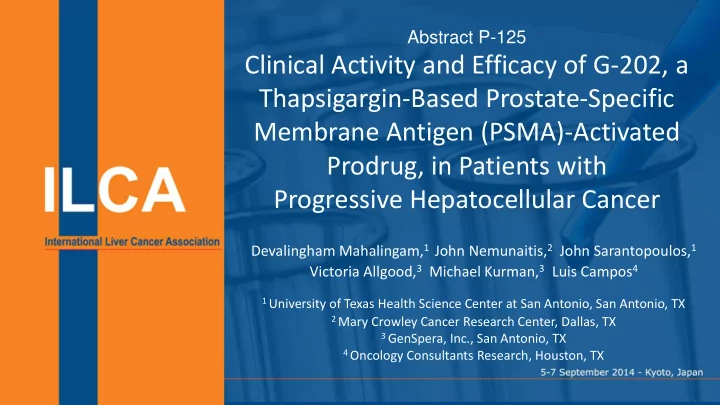

Abstract P-125 Clinical Activity and Efficacy of G-202, a Thapsigargin-Based Prostate-Specific Membrane Antigen (PSMA)-Activated Prodrug, in Patients with Progressive Hepatocellular Cancer Devalingham Mahalingam, 1 John Nemunaitis, 2 John Sarantopoulos, 1 Victoria Allgood, 3 Michael Kurman, 3 Luis Campos 4 1 University of Texas Health Science Center at San Antonio, San Antonio, TX 2 Mary Crowley Cancer Research Center, Dallas, TX 3 GenSpera, Inc., San Antonio, TX 4 Oncology Consultants Research, Houston, TX
Background • Thapsigargin induces apoptosis through disruption of calcium homeostasis. • G-202 is a thapsigargin-based prodrug whose cytotoxic activity is blocked by a masking peptide that is cleaved by PSMA, a membrane-bound protease expressed in prostate cancer cells and the endothelium of tumor vasculature but not in most other tissues or the vasculature of normal tissue. • In a Phase I study of G-202 in patients with advanced solid tumors, prolonged disease stabilization was observed in the subset of patients with advanced hepatocellular carcinoma (HCC) and prompted development of a Phase II study to further evaluate activity of G-202 in this patient population. • To date, 23 patients with advanced HCC have been treated with G-202 in the Phase I and Phase II studies.
Clinical Trials of G-202 in HCC Phase I First-in Human Study • Multi-center, dose escalation, 3+3 design • Advanced solid tumors • One-hour intravenous infusion in saline on Days 1, 2 and 3 of 28-day cycle • Protocol-defined MTD not reached; 66.8 mg/m 2 established as MTD with 40 mg/m 2 on Day 1 to avoid infusion-related reactions • 44 patients treated, including 5 with HCC at 40/66.8/66.8 mg/m 2 • Prolonged disease stabilization in HCC (9-12 months) observed in 2 of 5 patients Phase II Study in HCC after Progression on Sorafenib • 18 patients enrolled • 40 mg/m 2 on Days 1, 2 and 3 accepted for this patient population • 3 patients continue on study; study remains open to enrollment
Patient Demographics
Safety Observations Related SAEs of any Grade Prevalence creatinine increased/acute renal failure/acute kidney injury** 3 pts (13%) congestive heart failure 1 pt (4%) pyrexia 1 pt (4%) * Current results; patients continue on study and study is open to enrollment
Clinical Activity * Current results; patients continue on study and study is open to enrollment * Current results; patients continue on study and study is open to enrollment
Time on Treatment 28-Day Cycles 1 2 3 4 5 6 7 8 9 10 11 12 Phase Ib 1 2 3 4 5 ( 22 months – compassionate use) Phase II 1 2 3 4 5 6 7 8 9 10 11 12 13 14 15 16 patient continues treatment
G-202 Effects on Blood Flow in HCC Baseline After Cycle 2 K trans (min -1 ) = 0.757 K trans (min -1 ) = 0.1366
Clinical Observations • G-202 administration results in disease control rate (CR + PR + SD) at two months of 80% • One patient with vertebral metastases has significant reduction in bone pain • 50% of patients with Stable Disease for ≥ 4 months • Long- term disease stabilization (≥ 12 months) in 2 patients (10%) • Frequently, target lesions remain stable with Progressive Disease assessment based on detection of new lesion
Conclusions • G-202 administered intravenously for 3 consecutive days of a 28-day cycle is generally well-tolerated in patients with advanced disease • G-202 as a single agent promotes disease stabilization in patients with advanced HCC who have progressed on sorafenib • HCC lesions are typically highly vascularized and G-202 appears to effect tumor vasculature, with decrease in blood flow metrics • Evaluation of G-202 in a combination regimen is warranted in patients with HCC.
Recommend
More recommend